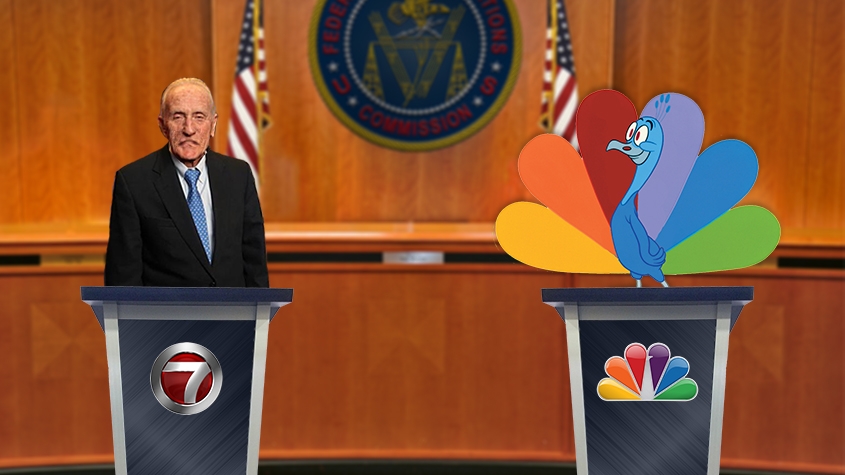WHDH-TV owner Ed Ansin is vowing to contest NBC's plans to move its affiliation from WHDH to its owned and operated station WNEU-TV in January 2017.
One of Ansin's arguments is an agreement Comcast made with the FCC when it bought NBC five years ago to ensure that people would continue to get NBC programming free over-the-air without being forced to buy cable, which Comcast is the biggest supplier of in Boston. With the move to WNEU, Ansin says Comcast will be breaking this promise because the signal reach of WNEU reaches less than half of the Boston television market.
"They have the right to buy a station, change affiliation. That's their privilege. They don't have a right to violate the agreement between Comcast and NBC and the affiliates, and the government," Ansin said in an interview with his own station. "This is clearly not in the public interest. They will have half the coverage area of Channel 7. They will reach less than half of the population."
 Ansin's biggest issue with NBC leaving WHDH is in the fact that WNEU has only half of the coverage as NBC does, and to him this falls into being "not in the public interest." Massachusetts Senator Ed Markey, with whom Ansin met with on Thursday, seems to agree and gave the impression that he sided with WHDH... and the poor kid in Brockton.
Ansin's biggest issue with NBC leaving WHDH is in the fact that WNEU has only half of the coverage as NBC does, and to him this falls into being "not in the public interest." Massachusetts Senator Ed Markey, with whom Ansin met with on Thursday, seems to agree and gave the impression that he sided with WHDH... and the poor kid in Brockton.
"We don't want to see a day when there's a kid in Brockton, a poor kid, that wants to watch the Patriots on a Sunday night, and they don't have access to NBC for free on their local television station and they don't subscribe to cable," Markey said. "We have to make sure that that kid and every adult in our region has access to free over-the-air television, universal."
While signal strength and location are a big issue for WNEU, NBC has not yet released plans on how it plans to fix this yet. However, in a statement NBC said "We are committed to expanding our over-the-air coverage of the market and are currently looking at a variety of options to accomplish that."
So how might NBC solve this issue? First off, lets start off with a reminder that we are only talking about a small amount of viewers that would be affected. Most reports have said that up to 10% of the Boston television market relies on a free over-the-air signal. Data from the Television Bureau of Advertising, a not-for-profit trade association of the television industry, states that Boston currently has a 96% cable/ADS penetration rate, with only 4% relying on over-the-air in their most recent November 2015 survey.
With that being said, there are solutions that would allow the "poor kid" in Brockton to watch the New England Patriots for free.
The easiest solution is for Ansin to sell the license of either WHDH or WLVI to NBCUniversal, which would give it a full power television station with the same reach as WHDH. Will that happen? NBC has 500 million reasons to not go down that route.
 The second possible solution is WTMU-LP, a low power television station owned by ZGS Communications that has coverage in the Boston area. The station has been a translator for WNEU simulcasting Telemundo Boston since April 2003. WTMU hasn't been without its own issues however, and was affected significantly with the switch to digital television. Its channel assignment changed three times, and the station was off-the-air for two years due to signal interference and the re-assignment of channel to other stations making the switch to digital. Though low-power television stations were exempt from the 2009 deadline to cease broadcasting on analog signals, WTMU tried to make the swith to digital early. At one point in 2008, WTMU was actually going to move to channel 42 when WHDH made the move to channel 7. However, in 2009 WHDH made a request to return to channel 42 which was granted by the FCC. WTMU eventually ended up on channel 46, but has been broadcasting in analog under special temporary authority by the FCC with its transmitter in a temporary location operating under reduced power.
The second possible solution is WTMU-LP, a low power television station owned by ZGS Communications that has coverage in the Boston area. The station has been a translator for WNEU simulcasting Telemundo Boston since April 2003. WTMU hasn't been without its own issues however, and was affected significantly with the switch to digital television. Its channel assignment changed three times, and the station was off-the-air for two years due to signal interference and the re-assignment of channel to other stations making the switch to digital. Though low-power television stations were exempt from the 2009 deadline to cease broadcasting on analog signals, WTMU tried to make the swith to digital early. At one point in 2008, WTMU was actually going to move to channel 42 when WHDH made the move to channel 7. However, in 2009 WHDH made a request to return to channel 42 which was granted by the FCC. WTMU eventually ended up on channel 46, but has been broadcasting in analog under special temporary authority by the FCC with its transmitter in a temporary location operating under reduced power.
So how is that a solution?
 WTMU is currently in process of making the move to digital, and once its digital signal is on-the-air it will reach into a large area that WNEU does not cover. Including Brockton, so that poor kid can watch the Patriots game.
WTMU is currently in process of making the move to digital, and once its digital signal is on-the-air it will reach into a large area that WNEU does not cover. Including Brockton, so that poor kid can watch the Patriots game.
There are still a few areas that WNEU would not cover, even with WTMU. The majority of that area is covered by NBC though... from WJAR-TV in Providence. So if its within the public interest to be able to watch free NBC network programming, can Ansin argue that the WJAR coverage doesn't count because its not a Boston station? With WHDH still being on-the-air as an independent station, all of the local broadcasting obligations and news that comes out of WHDH would stay, you'd just have to change the channel to watch NBC.
In the end, Ansin might not have a leg to stand on. The planning for this switch has been going on for a long time, and NBC has several solutions to the over-the-air signal issue that they can implement to fix it. The argument that Comcast might become too powerful could be a moot point as well. Of the properties they own, only WNEU is a broadcast station. NECN and Comcast SportsNet New England are both regional cable channels, so if its ok for the cable company to own these cable channels, adding an NBC affiliation might not matter.
Let's not forget that in the neighboring Springfield market, WGGB-TV holds the affiliations of ABC, CBS and Fox and it's sister-station WFSB (also a CBS station) is only 30 minutes away in Hartford, CT. One station controlling three out of the four sources of news seems pretty powerful to me, and the government approved that without issue.





